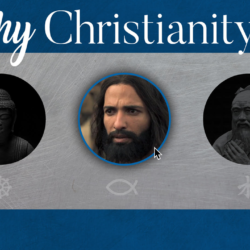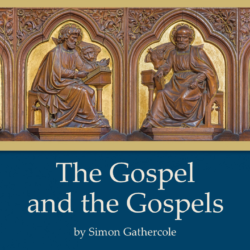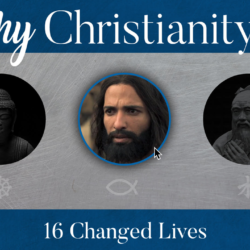Apologetics 12: New Testament Trustworthiness
For the New Testament we can employ several of the same lines of reasoning as the Old Testament, though there are a couple more to consider like internal evidence and messianic prophecies that help bolster the case. Furthermore, many people’s lives have been changed by reading and believing the words of the New Testament. No other book has such a legacy for radical life transformation.
If you would like to take this class for credit, please contact the Atlanta Bible College so you can register and do the necessary work for a grade.
Notes:
Reason #1: Archeology Supports the Bible
- Handout from Skeptics Search for God pages 227 to 234
- Handout from Case for Christ pages 92-99
- Building Belief, pages 145-146
- In Defense of the Bible ed. by Cowan and Wilder pages 236-239
Reason #2: Unflattering Honesty
- Consider the heroes of faith and their recorded failures:
- If they made it up, why would they paint themselves so true to life (moles and all)?
- Peter’s denials (Matthew 26.69-74)
- Paul’s persecution of the church (Acts 8.1-3)
- All of this is evidence that the Bible is legitimate—it honestly chronicles what happened. And if we can trust it when people would be inclined to change it for the sake of embarrassment, we can certainly trust it on matters such as the kingdom and the crucifixion/resurrection of Christ.
Reason #3: Changed Lives
- There is an old story about an atheist who challenged a Christian to a debate. The Christian responded, if you can provide me with one person who has been delivered from alcoholism, drug addictions, sexual perversion, violence, or another significant vice by atheism then I will debate you. And I will bring a dozen who have drastically changed as a direct result of their belief in the Bible.
Reason #4: Preservation
- Antiochus Epiphanes tried to destroy the Hebrew bible and Jewish practices
- The Roman Emperor Diocletian, following an edict in ad 303, attempted to destroy every New Testament
- 25 years after Diocletian, the next emperor, Constantine, paid for 50 more bibles to be copied
- Voltaire (18th century) predicted within a hundred years the bible would be gone, but 50 years after he died, the Geneva Bible Society used his house and printing press to produce many more bibles
- Today the bible is available in more languages than any other book (over 500)
- This reason alone does not prove the bible is true, but it coheres with the idea. In other words, if the bible were from God, we would expect he would have his hand on it to preserve it throughout the centuries
Reason #5: Internal Evidence
- What sort of books are the Gospels?
- What did the writers think they were doing?
- Luke 1.1-4; 2 Peter 1.16; 1 Corinthians 15.6
- they claim to have reported historical facts accurately
Reason #6: Messianic Prophesies
- Ralph Muncaster has calculated the odds of 118 non-messianic historical prophecies being true to be 1 chance in 10118. Thus it is more likely that the Bible is true than this pen will hit the floor when I drop it! In other words, to not believe in the Bible is more suicidal than to jump off a cliff and think that the law of gravity will not take effect!
- Promise to Abraham
- (Genesis 12:3, 18:18, 22:18)
- (Acts 3:25-26)
- Prophet like Moses
- (Deuteronomy 18:15-19)
- (Acts 3:22-23, John 1:43-49, 6:13-14)
- Raised from the dead
- (Psalm 16:10)
- (Acts 13:33-37
- Crucifixion experience: these are especially significant because there was no way for Jesus to fulfill these intentionally. When the Roman executioners torture and kill someone, they do not obey his or her wishes.
- (Psalm 22, Isaiah 52& 53)
- (Matthew 27, Mark 15, Luke 23, John 19)
- Opened not his mouth Isaiah 53:7 Matthew 27:13-14, 26:6
- Marred visage Isaiah 52:14 Matthew 26:67, 27:27-30 Isaiah 53:5 Mark 14:65, 15:17-19 Luke 22:63-65 John 18:22, 19:1-3
- Treatment by people Psalm 22:6-8 Matthew 27:39-44, Isaiah 53:3 Mark 15:29-32 Luke 23:36-39
- Counted with sinners Isaiah 53:12 Mark 15:27-28
- Parted garments Psalm 22:18 John 19:23
- Cast lots Psalm 22:18 John 19:24
- “My God, my God” Psalm 22:1 Matthew 27:46
- Poured out like water Psalm 22:14 John 19:34
- Grave with the rich Isaiah 53:9 Matthew 27:57-60
- No bones broken (Jesus is our Passover lamb)
- (Exodus 12:46, Number 9:12)
- (John 19:31-36)
- Ascension
- (Psalm 110:1)
- (Acts 1:9, Mark 19:19, Romans 8:34)
- Priest after the order of Melchizedek
- (Psalm 110:4)
- (Hebrews 5:5-10)
- Exalted, extolled, be very high
- (Isaiah 52:13, Zechariah 9:9)
- (Matthew 17:1-5, Matthew 21:1-11)
Reason #7: Jesus Predicts the Future
- One of his disciples would betray him (Mat 26.21)
- His disciples would desert him (Mat 26.30-31)
- Peter would deny him three times (Mat 26.33-34)
- his death, how he would die, and resurrection: Jesus prophesied more about this than anything else (except that the kingdom is coming)
- Mat 12.40; 16.21; 17.22-23; 20.17-19; 26.61; 27.40, 63;
Mark 8.31; 9.30-32; 10.32-34; 14.58; 15.29-30
Luke 9.21-22, 44-45; 18.31-34
John 2.13-22; 3.14-16; 12.32-34
- Mat 12.40; 16.21; 17.22-23; 20.17-19; 26.61; 27.40, 63;
- Persecution would come on his followers (Mat 24.9)
- this one is significant because it extends well beyond the writing of the New Testament
Reason #8: Martyrdom
- Consider the disciples who carried forth the message, who knew if it was really true or not. Christian martyrs are different than other martyrs because they were dieing for a historical fact, not a philosophy.
- Handout Christian Martyrs from 101 Reasons…by Ralph Muncaster p. 182-184
- many of the apostles were martyred (especially Paul and Peter)
- Matthew 24.9 “Then they will deliver you to tribulation, and will kill you, and you will be hated by all nations because of my name”
- Pliny the Younger (ad 113): “Accordingly, I judged it all the more necessary to find out what the truth was by torturing two female slaves who were called deaconesses. But I discovered nothing else but depraved, excessive superstition…. Meanwhile, in the case of those who were denounced to me as Christians, I have observed the following procedure: I interrogated these as to whether they were Christians; those who confessed I interrogated a second and a third time, threatening them with punishment; those who persisted I ordered executed. For I had no doubt that, whatever the nature of their creed, stubbornness and inflexible obstinacy surely deserve to be punished.”
- Question: How do you know they were telling the truth about what they saw?
- Answer: They were eyewitnesses (Acts 10.39-41). Is it more credible to trust someone who was there and sealed their testimony with their own blood or you?
- Question: Why do you believe the bible is true if there are so many contradictions?
- Answer: They all agree on the kingdom, the crucifixion, and the resurrection, do you believe in that?
Dealing with Alleged Contradictions
- Some resources to help
- Encyclopedia of Difficult Texts by Gleason Archer
- Hard Sayings edited by Walter C. Kaiser
- Answers to some bible difficulties






